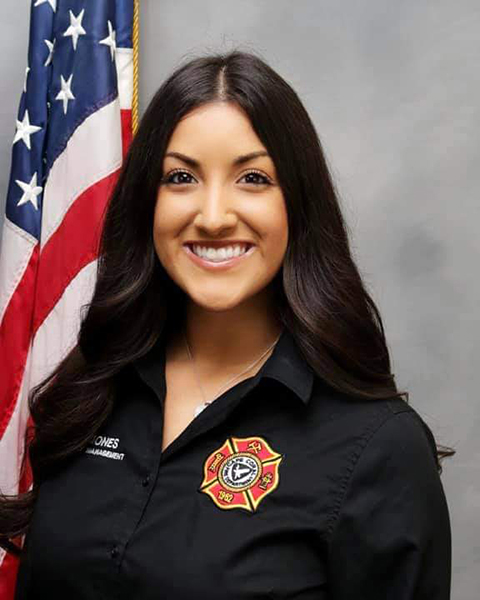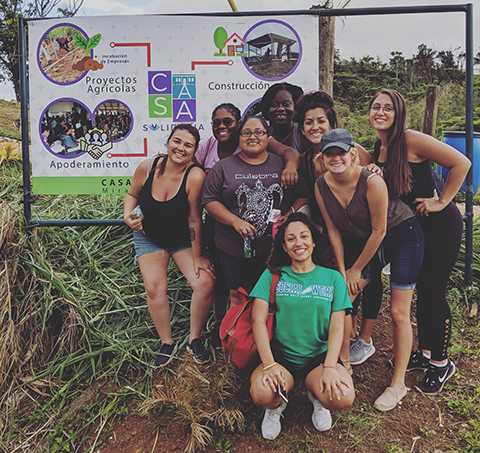Florida Gulf Coast University issued the following announcement on November 4.
Like many young adults deciding on a college major following the immense popularity of television shows such as “Bones,” “Criminal Minds” and the ubiquitous “CSI” series, Caroline Briones enrolled at Florida Gulf Coast University intending to go into the profession of forensic science.
But Briones changed that plan following a heart-to-heart conversation with a Zeta Tau Alpha sorority sister, a social work major who had just won the Marieb College of Health & Human Services Undergraduate Student of the Year Award. Today, armed with bachelor’s and master’s degrees in social work, and after a life-changing study trip to hurricane-ravaged Puerto Rico, Briones is at the forefront of a movement to incorporate social workers into fire departments and other emergency management agencies.

Caroline Briones is an emergency management coordinator for the Cape Coral Fire Department. Photo submitted.
“I grew up watching TV shows like ‘CSI’ and ‘Criminal Minds’ and always wanted to be like those characters,” she said. “I started off at FGCU with the intention of pursuing a forensic studies and/or criminal justice degree. I loved the material I was learning, but I was finding myself more drawn toward the sociological and psychological aspects of the material, as opposed to the law enforcement side of things.”
That’s when she talked in-depth with her sorority sister who was studying social work. “She spoke so highly of the program and the profession itself, and I was instantly sold. The following semester, I signed up for ‘Introduction to Social Work’ and applied for the bachelor of social work program,” Briones said. “It’s the stereotypical ‘I have always wanted to help people’ story.”
Briones graduated in May 2020 with her bachelor’s degree — and Marieb’s Undergraduate Student of the Year award — and completed her master’s a year later. What proved most transformational for her, though, was a 2019 summer travel course examining social work practices with Latinx populations after natural disasters, which was led by faculty members Tom Felke and Lirio Negroni.
“We traveled to Puerto Rico about a year and a half after Hurricane Maria devastated the islands, and we witnessed the trauma it had left behind,” Briones said. “Over a year later, there were still homes covered in tarps, areas with poor access to electricity and even barriers to adequate health care. While there, we were able to meet with and learn from local companies and community partners who self-organized grassroots movements to further advocate for equitable health care, financial freedom and recovery support at all levels of government. This experience introduced me to disaster-relief social work and social work outside of the continental U.S.”

In summer 2019, Caroline Briones joined other FGCU students in a community service project in Puerto Rico.
Shortly after returning from the trip, Briones fulfilled her field education requirement as the first social work intern through a then-new FGCU partnership with the Cape Coral Fire Department. She landed a full-time emergency management coordinator position there upon graduation.
“My tasks change day to day, but my primary role is to oversee the fire department’s volunteer program of about 200 people. This includes the city’s established Community Emergency Response Team, as well as other volunteer areas such as community risk reduction and internal business support. Our volunteers assist in everything from public affairs support to helping with the city’s disaster preparedness and response efforts,” she said.
Much of her work is focused on preparing community members for natural and man-made events and incorporating many different partners for a whole-community approach to disaster preparedness and response.
“For example, after an incident like a hurricane, it is so important to get all critical businesses up and running again. If we can build a strong partnership with our local businesses on a regular basis, we will have a better understanding of their capabilities and needs while in a disaster,” Briones said. “Utilizing my knowledge of local nonprofits and social service agencies, I have been able to help build multiple new partnerships in our community, some even with other FGCU alumni.”
Briones’ faculty mentors at FGCU say they are not surprised at her success. “During her time in the BSW program, Caroline displayed natural leadership qualities as well as a willingness to pursue opportunities that were unique to the program,” said Felke, associate professor of social work and Marieb College’s associate dean for academics. “Caroline is an outstanding example of an engaged student staying committed to the FGCU vision, mission and guiding principles as an alumna. She is a wonderful embodiment of all that FGCU represents and serves as a model for current students as they progress through their academic programs into their eventual careers.”
Negroni, professor of social work, said she was impressed with Briones’ leadership and initiative during the trip to Puerto Rico. “Caroline was quite active in raising issues and acknowledging the strengths of the people in Puerto Rico. She kept reflecting on how her learning would translate into practice when she returned to Florida to serve as a social worker. It was evident to me that this course was an eye-opener and a transformative experience for her,” Negroni said. “During her senior year, we had several conversations that demonstrated her commitment to advocate for social justice and human rights on behalf of underserved populations. Caroline took quite seriously her role as an agent of change and creator of new opportunities and services.”
The inclusion of social workers like Briones in emergency management and first-responder agencies is an emerging trend, Felke added.
“Social workers are well-suited through their training to address the complexity of issues that come about from emergency situations. Social workers can play a role in these agencies with both those who experience trauma as well as those who are responding to the same,” he said.
- Read more about the Puerto Rico research trip
Original source can be found here.

 Alerts Sign-up
Alerts Sign-up